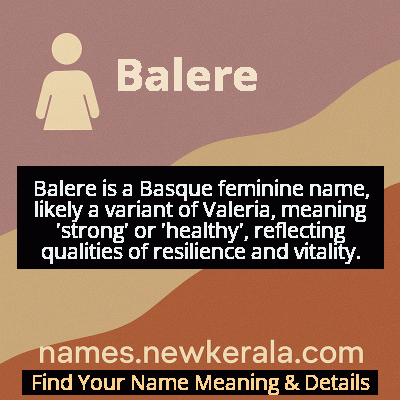Balere Name Meaning & Details
Origin, Popularity, Numerology Analysis & Name Meaning of Balere
Discover the origin, meaning, and cultural significance of the name BALERE. Delve into its historical roots and explore the lasting impact it has had on communities and traditions.
Name
Balere
Gender
Female
Origin
Basque
Lucky Number
7
Meaning of the Name - Balere
Balere is a Basque feminine name, likely a variant of Valeria, meaning 'strong' or 'healthy', reflecting qualities of resilience and vitality.
Balere - Complete Numerology Analysis
Your Numerology Number
Based on Pythagorean Numerology System
Ruling Planet
Neptune (Ketu)
Positive Nature
Intuitive, analytical, spiritual, and inquisitive.
Negative Traits
Secretive, reserved, aloof, and can be overly critical.
Lucky Colours
Green, yellow.
Lucky Days
Monday.
Lucky Stones
Cat’s eye, moonstone.
Harmony Numbers
1, 5, 6.
Best Suited Professions
Scientists, researchers, spiritual leaders, detectives.
What People Like About You
Depth of knowledge, analytical skills, spirituality.
Famous People Named Balere
Balere Goñi
Traditional Basque dancer
Preserved and taught traditional Basque folk dances across the Basque Country
Balere Arrieta
Linguist and cultural activist
Founded the Basque language revitalization program 'Euskara Bizia' in Navarre
Balere Mendizabal
Weaver and textile artist
Revived traditional Basque textile patterns using ancient weaving techniques
Name Variations & International Equivalents
Click on blue names to explore their detailed meanings. Gray names with will be available soon.
Cultural & Historical Significance
Extended Personality Analysis
Individuals named Balere typically exhibit a remarkable combination of inner fortitude and compassionate strength. Their personality is characterized by a quiet determination that allows them to persevere through challenges without seeking recognition or praise. Baleres are often described as 'emotional anchors' in their social circles - reliable, steady, and capable of providing support during turbulent times. They possess excellent problem-solving abilities derived from their practical nature and ability to remain calm under pressure. While strong-willed, they are not domineering; their leadership style tends to be collaborative and inclusive. Baleres often demonstrate deep loyalty to family and community, valuing tradition while being open to necessary change. They typically have a strong connection to nature and physical activities, finding strength and renewal in the natural world. Their emotional intelligence allows them to understand others deeply while maintaining healthy boundaries. This combination makes Baleres both respected leaders and cherished friends who embody the Basque ideal of balanced strength - powerful yet gentle, determined yet flexible.
Modern Usage & Popularity
In modern times, Balere represents a conscious choice by parents seeking to honor Basque heritage while bestowing a name with powerful meaning. While statistically uncommon compared to popular Basque names like Ane or Leire, Balere has experienced a modest revival as part of the broader Euskal Pizkundea (Basque Renaissance) movement that began in the late 20th century. The name appears most frequently in the Basque Autonomous Community and Navarre, with scattered usage in French Basque territories and diaspora communities in Argentina, the United States, and Mexico. Contemporary usage trends show that parents choosing Balere are typically highly educated, culturally engaged, and often involved in Basque language revitalization efforts. The name's rarity adds to its appeal for parents seeking distinctive yet culturally meaningful names. Digital globalization has also increased awareness of traditional Basque names, with Balere occasionally appearing in international baby name discussions focused on strong, culturally rich names for girls. Its modern usage reflects both cultural preservation and the evolving nature of Basque identity in the 21st century.
Symbolic & Spiritual Meanings
Balere carries profound symbolic meanings that extend beyond its literal translation of 'strong.' It represents the enduring spirit of the Basque people - a culture that has maintained its unique identity despite centuries of political and cultural pressures. Symbolically, Balere connects to the ancient Basque harri (stone) structures that dot the landscape - enduring, foundational, and deeply connected to the land. The name embodies the metaphorical strength of the Basque language itself, one of Europe's oldest surviving languages that has weathered numerous attempts at eradication. In a broader sense, Balere symbolizes the quiet, often overlooked strength of women who preserve cultural knowledge, maintain family traditions, and provide emotional stability across generations. It represents resilience not as loud defiance but as persistent continuation - the strength to endure, adapt, and thrive. The name also carries environmental symbolism, connecting to the powerful forces of the Bay of Biscay and the steadfast Pyrenees, reflecting the Basque relationship with their dramatic natural surroundings where strength is essential for survival and flourishing.

